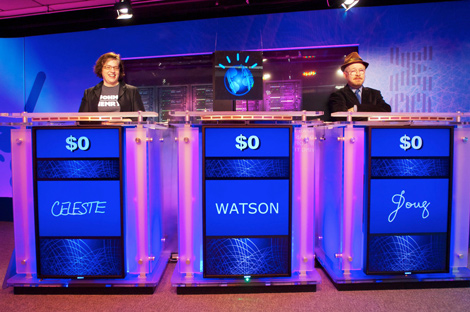Watson vs. The World

Former Jeopardy champion contestants face off against Watson in a test run at IBM Research Labs
It may just be the greatest man vs. machine matchup since chess champion Garry Kasparov squared off against Deep Blue.
This week, the two most celebrated and successful players in Jeopardy history matched wits in a three-day competition against Watson, an IBM supercomputer, and, as many predicted, the artificial intelligence program won by a landslide.
Brad Rutter, who holds the shows record for the most winnings at $3.25 million, and Ken Jennings, who holds Jeopardy’s longest winning streak of 74 games, bravely went up against a computer that can sort through several hundred million pages of information in seconds. At the end of the day, Watson’s winnings amounted to $77,147, with Jennings and Rutter finishing with $24,000 and $21,400 respectively.
Watson, named after IBM founder Thomas J. Watson, took over four years to make and is a significant step toward more sophisticated artificial intelligence. The data stored in Watson (over 15 terabytes of it) was acquired through the Internet, books, and journals, and the program can understand human language and answer questions through reasoning and machine-learning technologies.
Watson’s language-parsing ability is what sets it apart from other supercomputers. Understanding the nuances of human speech and communication remains one of the greatest challenges in the field of AI, so creating a computer that can compete on a quiz show both demonstrates remarkable progress and opens the door to many future developments.
Currently, search engines are keyword-oriented. But if computers could pick apart jargon, riddles, and even sarcasm, then search engines could be powered by intelligence instead of just keywords. Applications for such powerful technology include a forthcoming collaboration between IBM, Columbia University, and the University of Maryland to create a cybernetic doctor’s assistant, and potentially a robotic shopping and technical support guru for a major electronics retailer.
So should we all be preparing to, as Ken Jennings humorously wrote in his final Jeopardy response, “welcome our new computer overlords?” Not so fast, explains David Ferucci, a lead researcher from Watson’s development team. In yesterday’s New York Times article he likens Watson to the helpful computer on Star Trek, rather than the malicious HAL from 2001: A Space Odyssey: “HAL’s not the focus, the focus is on the computer on Star Trek where you have this intelligent information seek dialog, where you can ask follow-up questions and the computer can look at all the evidence and tries to ask follow-up questions. That’s very cool.”
Check out this video to see why playing Jeopardy is the ideal way to test Watson:
Think you’ve got what it takes to outsmart Watson? Try your hand at the New York Times‘s Watson Trivia Challenge.
Images:
IBM/Facebook
Filed under: Biomedical, Computer, e-News, Electrical
Tags: Biomedical, Computer, Electrical








